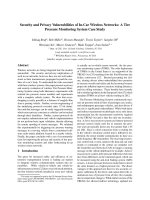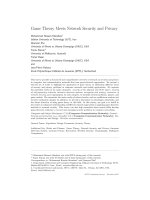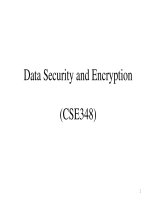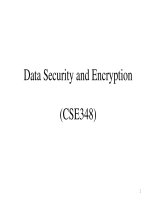Final0410 data usability, data security and privacy, ethical considerations, artificial intelligence bank of ireland
Bạn đang xem bản rút gọn của tài liệu. Xem và tải ngay bản đầy đủ của tài liệu tại đây (55.11 KB, 6 trang )
INTRODUCTION
Data management and data analysis are essential requirements in the operation of
commercial banks. The standard solution for most commercial banks worldwide is to
innovate core technology to store and provide the necessary information in the bank's
operations. However, this is not enough to help commercial banks or Bank of Ireland to be
more specific to take advantage of the data in their business operations. Business analytics
is always helpful for quickly collecting a large amount of data and presenting it in an
appealing visual format. It is also regarded as a means of achieving various specified goals
and making better decisions about the Bank of Ireland's business matters. This study will
examine data usability, security and privacy, ethical considerations, and artificial
intelligence applications in the Bank of Ireland.
Data Usability
Data usability is defined as a service user's ability to derive various useful
information (Winter & Hinely, 2012). In general, a database is a collection of various bank
data, such as the Central Bank-run databases, which collect credit information from lenders
monthly for loans of €500 or more (Nandy & Shao, 2010). The database contains
information lenders can use to make credit decisions on potential loans. When digital
technology is widely used, the ability of commercial banks to profit from data increases
significantly. However, commercial banks must solve the two most important problems of
Data Usability to do this. Specifically:
•
The benefits and costs of a database to its stakeholders are as follows: The
database system is a set of interconnected data and program sets that access those data. The
Data Protection Commission fined Bank of Ireland €463,000 in April for a series of data
breaches involving customer personal information, including "some combination of name,
mailing address, phone number, email address, passport number, account information, date
of birth, and gender." (O'Donovan, 2022). The issue resulted in some unauthorized
disclosures of personal data and accidental changes to data on the CCR. However, it can be
said that these databases provide a variety of benefits to their stakeholders, including:
Effective data integration: Implementing a database system allows stakeholders to
integrate with the Bank of Ireland's various services (Semenov et al., 2019). It is also
advantageous to see how processes in any of the bank's segments affect others. While
small-scale data integration deployments use customized programs or database procedures,
mid- to large-scale data integration deployments such as Bank of Ireland or CCR often use
general-purpose data integration tools (Chen et al., 2015). General purpose tools can
significantly increase development productivity by providing commonly used functionality
for system interconnection and data standardization.
Quick Decision making: A better database management system and procedures
result in higher quality information. The growth of big data science, digital data and
analytics are providing opportunities for banks and financial companies to improve credit
decision models, achieve high approval rates, and help Quickly find and group potential
customers with non-potential customers. The speed of identifying objects will help reduce
costs or significantly shorten deployment time (Bolhuis et al., 2019). With the automation
of most of the components in the modern model, banks can also cut a significant part of
costs from maintaining the manual steps of the traditional model. These initiatives will be
beneficial in making faster and better decisions for various stakeholders of financial
institutions.
Providing additional services for customers: Based on the bank's database, the bank
can attract more or retain customers by introducing other services. For example, a bank
may offer investments with attractive interest rates to customers with idle funds or
conservative investors. The bank can also recommend short-term loans to customers who
have easy spending habits to meet daily needs or loans to meet the short-term liquidity
needs of the business and analyze the customer's profile to bundle other services with
offers focused on the customer's needs.
•
Predictive, descriptive, and prescriptive applications for data available in software
of required data analytics tool:
Descriptive data is generally concerned with the collection and analysis of data in order to
answer questions about what happened in the past of Bank of Ireland (Ma, 2020). It
demonstrates that Bank of Ireland was the only Irish bank to win a prize for 'Best
Customer Facing Technology' on the night. The awards recognized achievements in the
Retail Banking industry and challenged candidates to share their recent successes, with
Bank of Ireland taking home the Best Customer Facing Technology award. It can also be a
description or summarization of raw data from the Bank of Ireland, which can help make
something more understandable to each bank user. Descriptive data consists primarily of
data described in the past and is the location of an incident whenever it occurs, such as the
€24.5 million fine imposed by the central bank in December 2021 for IT deficiencies that
took over a decade to resolve.
Predictive Applications of Data were widely regarded as forecasting techniques that
explained what might happen in the future (Kogdenko, 2019). Customers will have other,
more particular needs starting from the bank's basic needs in the transaction process. With
BOI, their mission is to research to find those needs and be proactive in providing and
meeting customer needs. In the future, BOI plans to hire more leading experts in the field
of information security and encryption to ensure that there will be no mistakes in managing
and securing customer information. This will strengthen and gradually regain the trust of
customers in Ireland.
Data prescriptive applications are useful in optimization and algorithm simulation
to provide advice on every possible outcome of what to do. This prescriptive analysis will
primarily focus on quantifying various software tools that affect future decisions to advise
all possible results using data analytics tools (Kogdenko, 2019). Prescribing bank data
provides employees with a wealth of customization options and an extensive array of data
structures and scenarios to optimize execution. Banks typically simulate data related to
consumers, business customers, savings deposits, loans, and other credits and investments.
With Prescriptive data, managers can easily manage the bank with many activities at both
the spearhead and the administrative department in a single geographical market.
Data privacy and security
Data security- It primarily explains BOI databases' issues, which may be violated
due to flaws in their features. Data security is guaranteed if data access rights are strictly
managed, along with promoting the prevention and prevention of unauthorized data access
(Tankard, 2012). BOI has been fined not only for the breaches but for delays in
communicating with the affected customers. If BOI's user data is successfully sold,
scammers can use this personal information for malicious purposes. In particular,
scammers can use personal information such as full name, date of birth, phone number,
home address, bank card number and account balance to borrow money from credit
institutions.
Data Privacy- Data privacy was about controlling the data collected and the process
used by BOI, and it explained how various relational databases were developed. The
increasing development of digital technologies also increases security flaws and the
behaviours and tricks of high-tech criminals. According to (Verizon's) Data Incidents 2021
report, financial institutions have the second largest number of data-related incidents
compared to other professions. The IT system in Ireland always faces many risks such as
hackers, computer viruses, malicious code attacking the server system, data as well as
personal computers of bank employees.
Accuracy Issues- Data accuracy is considered critical to the success of any credit
institution, and it also refers to various data values stored with correct values (Robinson,
2014). Currently, the data sources the bank uses can come from within the organization,
data from the Internet and data provided by third parties. Still, these data sources are not
always reliable (Mitnitski et al., 2003). Many distributed data warehouses of BOI can also
lead to inefficient data governance, increasing the risk of data leakage to the outside. Due
to the existence of many data warehouses serving different purposes, the reports from these
repositories will vary. However, these repositories all get data from a common source, and
the output results will be different due to different ways of getting it. Therefore, BOI plans
to cooperate with Infosys and Amigo to implement the Data Warehouse project after the
data breach in April(Charlie., 2022).
Ethical Considerations
Ethical consideration of BOI is generally the issue raised by every individual whose
data has been corrupted. There are a few ethical considerations that should be discussed,
including:
•
Ethical Considerations whether BOI’s users have options to opt in and out of their
stored data: BOI may own certain types of customer information either directly or through
third parties (McKenna, 2022). The customer will provide basic information such as name,
address, email and date of birth when doing banking transactions. Additionally, goods and
service providers will collect information such as forte, demand for products and shopping
habits. This collection of customer data by BOI is within the jurisdiction of the financial
institution, but it is necessary to ensure data security.
•
Ethical issues of maintaining, gathering, and using those data: In addition to
assisting customers in avoiding attempts by fraudsters to steal their account details, BOI
recognizes the importance of keeping their customer information as safe and secure as
possible while complying with relevant data protection legislation. Each year, their
colleagues across all jurisdictions are required to complete information security training to
ensure that they know how to keep customer information private and secure and avoid data
breaches (Hewitt, 2022). The promotion of technology application in data governance in
Ireland has been helping to exploit data resources effectively. BOI has many advantages to
using data from both external and internal sources, but taking advantage of them requires
good data governance and promotes new technologies such as computer science and
artificial intelligence in processing and decision-making. Details will be presented in the
following sections:
Artificial Intelligence
Artificial intelligence provides security services for banks when users make online
transactions, AI technology will send instant notifications to users and warn them of any
suspicious transactions happening. On the other hand, AI also eases the card validation
process and makes transactions safe and secure by tracking users' dealings with the bank so
that suspicious event can be detected. These AI products will use algorithms to identify
specific and unusual customer buying positions and conduct analyses of customer
shopping behaviour, normal price range and shopping time of each customer. These
algorithms will help identify strange behaviour quickly and lock the account until the
customer provides clarification. As of 2018, BOI has used 70 robots to perform 200 tasks
for more than a million customers, successfully distinguishing 500,000 operations that
customers can request from banks. This helps BOI secure information and minimize
financial risks (Kennedy, 2022).
CONCLUSION
With the development trend of the economy in general, good data governance is
gradually becoming a tool to help businesses become more efficient. In particular,
commercial banks need to pay special attention to this issue because of the safety and
confidentiality requirements for customer data. This report is structured by addressing the
various areas related to the above issues of the Bank of Ireland, focusing on its ethical
considerations, data security, privacy, data usability and artificial intelligence. The
increasing development of digital technologies also increases security flaws and the tricks
of high-tech criminals. Since financial institutions have the second largest number of datarelated incidents compared to other professions, BOI plans to implement the Data
Warehouse project after the data breach in April for safer customer information storage.
This customer data collection is within the bank's jurisdiction, but it is necessary to ensure
data security. To keep up with technology development, as of 2018, BOI has used robots to
perform tasks for more than a million customers, successfully distinguishing many
operations that customers can request from banks.
REFERENCES
Bolhuis, E., Voogt, J., & Schildkamp, K. (2019). The development of data use, data skills,
and positive attitude towards data use in a data team intervention for teacher educators.
Studies In Educational Evaluation, 60, 99-108.
/>Charlie, T. (2022). Banking on success: BoI’s use of robots allows it to be more human.
The Irish Times. Retrieved 12 April 2018, from
/>Chen, H., Ouyang, Y., & Jiang, W. (2015). An optimized data integration model based on
reverse cleaning for heterogeneous multi-media data. Multimedia Tools And Applications,
75(23), 15571-15586. />Cybercrime thrives during pandemic: Verizon 2021 Data Breach Investigations Report.
(2022). Retrieved 3 October 2022, from />Hewitt, O. (2022). Ethics and Behaviour - Irish Banking Culture Board. Irish Banking
Culture Board. Retrieved 2 October 2022, from
/>Kennedy, J. (2022). Bank of Ireland prepares for the Netflix-style future of banking.
Silicon Republic. Retrieved 4 October 2022, from
/>Kogdenko, V. (2019). Descriptive, predictive, and prescriptive analytics: Data, methods,
and algorithms. Economic Analysis: Theory And Practice, 18(3), 447-461.
/>Ma, A. (2020). Making Data Reports Useful: From Descriptive to Predictive. Cureus.
/>McKenna, L. (2022). Bank of Ireland: Placing ethics at the heart of banking | Let's talk
financial services - Mazars. Let's talk financial services - Mazars. Retrieved 4 October
2022, from />Mitnitski, A., Mogilner, A., MacKnight, C., & Rockwood, K. (2003). Data integration and
knowledge discovery in biomedical databases. Reliable information from unreliable
sources. Data Science Journal, 2, 25-34. />Nandy, D., & Shao, P. (2010). Why are Institutional Loans More Expensive than Bank
Loans? Evidence from the Syndicated Loan Market. SSRN Electronic Journal.
/>Robinson, E. (2014). Gartner warns of big data security problems. Network Security,
2014(6), 20. />
Semenov, V., Ilyin, D., Morozov, S., & Tarlapan, O. (2019). Effective consistency
management for large-scale product data. Journal Of Industrial Information Integration, 13,
13-21. />Tankard, C. (2012). Big data security. Network Security, 2012(7), 5-8.
/>Winter, J., & Hinely, M. (2012). Examining Correlations in Usability Data to Effectivize
Usability Testing. E-Informatica Software Engineering Journal, -1(-1).
/>









